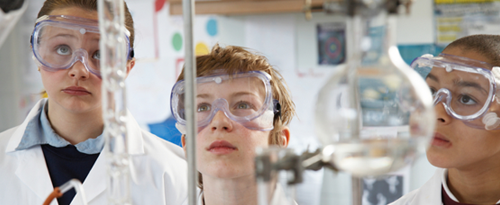Is there a light at the end of the tunnel, or is it a train bearing down on us?
One of the unfortunate consequences of living in a time of significant change is that it can discourage long term planning. Why bother sorting things out properly when someone’s going to come along and move the goalposts? Everything can end up a bit, well, provisional. Some of the students I taught in my last school came from farming backgrounds and some of them were strong believers in the near universal applicability of bailer twine. Always got a bit in their pocket: no limit as to what you can fix with it. We’ve got a few departments with things held on with bailer twine.
Of course, there’s some likely candidates for aspects of our work that are, shall we say, a bit on the unresolved side at the moment. Tracking and assessment at KS3? Stick with levels for a bit, see where it’s going. Role of practical work? Well, see how it goes; don’t want to lose it but not sure it’ll count for much in the future. Scheme of learning for GCSE? Well, that’s in the melting pot! Now, this isn’t wrong and it’s better than jumping in a direction that later turns out to be ill-advised. However there comes a stage when the bailer twine has to be replaced with something a bit more long term.
The outcome from the General Election means that, for better or worse, there’s likely to be a significant degree of continuity from the previous regime. The sense seems to be that the heavy lifting on curriculum reform has been done and that the challenge is now to embed the developments. For science this is that the new programmes of study at key stages 1, 2 and 3 will continue to be embedded, that the new A level specifications will be implemented from this September and the new GCSEs from next September. The technical issues around the latter, covering matters such as practical assessment will be clarified before the end of May. Testing will remain as it is and A level and GCSE exams firmly positioned at the end of the courses. There is likely to be another Education Bill shortly but this will address issues such as all secondary students having access to Ebacc subjects and senior leaders being replaced in failing schools. In other words, this is the system, now make it work.
Perhaps then, the next five years will be different to the previous five. Fewer changes and less money (but still with inspection – some things never change). Something that might be an emerging feature is more sharing of best practice. The incoming GCSEs are likely to have a lot in common with each other, so effective ideas are likely to work across the board – or rather, across the boards.
The other emerging feature is a greater focus on science education across 11 to 16 as being a continuum. That’s not to say that GCSEs start being taught in Year 7, but rather that KS3 is planned as a prequel to GCSE rather than a separate course to be got through before the serious business of preparing for public examination begins. A number of schools I visit are now more inclined to be talking about what they should be doing in the early years of secondary to ‘build strong foundations’, whether in concept, process or key skill, such as literacy or numeracy.
I was convinced the limits of bailer twine had been reached when I found a student trying to mend a hole he’d made in a boiling tube by fusing the end of the cord onto the glass in a Bunsen flame. Well, trying to. Time comes when a longer term plan is called for.
Ed Walsh


